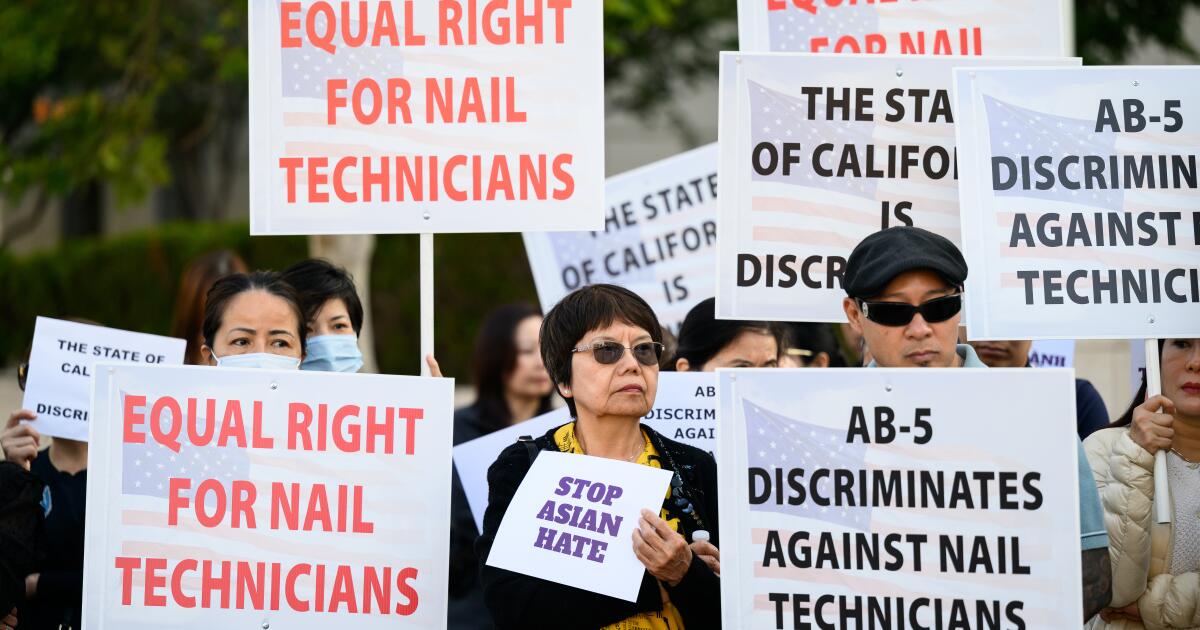Several Vietnamese American-owned nail salons in Orange County have sued California, alleging the state’s labor code is discriminating against their businesses.
The lawsuit, filed in U.S. District Court in Santa Ana on Friday, alleges that the state’s labor code violates the 14th Amendment’s guarantee of equal protection under the law by forcing nail technicians to be classified as employees.
The suit argues that professionals in the beauty industry for years have operated as independent contractors, renting space in a salon and bringing in their own clients. That changed at the beginning of 2025, when nail technicians under the labor code became required to be classified as employees, the lawsuit said.
State Assemblyman Tri Ta (R-Westminster), who represents Little Saigon and surrounding communities, said his office has fielded much concern from Vietnamese American nail salon owners.
“Their lives have turned upside down overnight,” Ta said at a news conference Monday morning. “It is not just unfair, it is discrimination.”
The switch in labor law came in 2019 when Assembly Bill 5, a sweeping law governing worker classification rules across various industries, was approved. It codified a California Supreme Court decision creating a stricter test to judge whether a worker should be considered an employee rather than an independent contractor.
AB 5 sought to crack down on industries in which many workers are misclassified as independent contractors, who are not afforded protections including minimum wage, overtime pay and workers’ compensation that employees have access to. But various industries have said AB 5 targets them unfairly, creating an uneven playing field for businesses.
Some professions received carve-outs, including doctors, accountants, real estate agents and hairdressers. Others such as truckers, commercial janitors and physical therapists must abide by the tighter classification rules.
Some implementation of the law was staggered to give industries, including nail technicians, time to adapt.
But Ân Tran, who owns two franchisee locations of Happy Nails & Spa that are among the businesses suing the state, said the law remains burdensome. Hiring employees is more costly, and it’s unfair that businesses hiring hairdressers, aestheticians and other beauty workers aren’t subject to the requirement, he said.
“We don’t have customers all the time. That’s going to cost us a lot more to pay them for the downtime when they don’t have any customers,” Tran said in an interview.
The requirement also defies the flexible work culture and control over their clients that many manicurists prefer, Tran said.
Emily Micelle was among several manicurists who spoke in support of the salon owners’ lawsuit at the Monday news conference.
“No one forced me to be here today. I chose to be here because I want to express my side of the story,” Micelle said. “Being [an independent contractor] means I can work for myself, I can be my own boss, I can create my own branding within the business, I choose my own hours, I choose my own clients. … The law means to protect us workers, but [being an employee] doesn’t work for everyone.”
The lawsuit describes how the nail salon industry in California became dominated by Vietnamese workers in recent decades, when Vietnamese refugees began fleeing to the U.S. in large numbers in 1975 after the fall of Saigon in America’s failed military intervention in Southeast Asia.
The industry “has become synonymous with the Vietnamese community,” the lawsuit said, with more than 82% of nail technicians in California being Vietnamese American and some 85% women.
The legal action highlights the tension between how small businesses can serve as a pathway for immigrants and others to build wealth, and how workers at times might have little formal recourse for low wages or unsafe work conditions, experts have said.
Researchers with the UCLA Labor Center last year analyzed U.S. Census Bureau data and released a report estimating that the hourly median wage for nail salon workers in 2021 was $10.94, below the then-$13 minimum wage for small businesses.
In 2017, four women sued a salon in Tustin, alleging that the owners had created bogus time records and paychecks to create an illusion that manicurists were paid lawfully by the hour, but instead workers were compensated based on a 60% commission system where their pay was further deducted for using business supplies, such as spa chairs.
Businesses that filed suit include multiple locations of Blue Nail Bar, Happy Nails & Spa and Holly & Hudson Nail Lounge.
